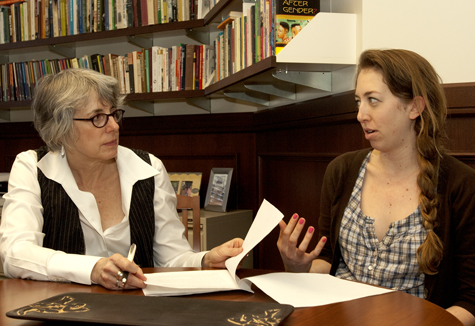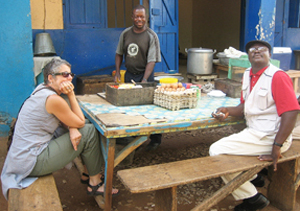
“Jungles, animals, safari.”
“Famine, war, disease.”
The very predictability of the answers is the reason that on Day 1 of Jean Allman’s African history survey course she asks students to write down the first three words that come to mind when they think of Africa.
Clustering the words on a board for discussion, Allman uses the exercise to help the class get past any negative or stereotypical impressions they may have about Africa before they begin to learn of the continent’s rich history.
“I want to know what students think about Africa, the images they have been bombarded with, where those images come from, and then help deconstruct them as we begin to learn about Africa’s cultural, political and social richness and its impact on world history,” says Allman, PhD, the J.H. Hexter Professor in the Humanities in Arts & Sciences and chair of the Department of History.
Regarded as one of the nation’s leading African historians, Allman shares her passion for the continent through her teaching, mentoring of undergraduate and graduate students, prolific writing and worldwide scholarly presentations, and editorship of a book series that ensures other scholars’ writings about African history are published.
‘Grabbed early on’
Allman easily can identify with her students’ “baggage.” Of all the continents, she feels Africa has the most negative media coverage. At a similar age, she notes, her understanding of the continent — from her South St. Louis high school’s geography class — was no better.
That changed the first quarter of her freshman year at Northwestern University with a seminar on Asante, a pre-colonial state in West Africa.
“I sort of got grabbed early on and stuck with it,” says Allman, a first-generation college student. “We studied a very complicated state system, and I just got pulled in by the historical richness and by its depth — and by the fact that when I was 18, I thought I was so well-educated. How did I not know about this?”
She took more courses in West African history as well as in early African-American history and found the historical connections between the two topics intriguing, spurring her to learn more.
Allman was at the right place. Northwestern has one of the oldest and most distinguished African studies programs in the country.
Even as an undergraduate, her teachers included eminent Africanist and African-American historians such as Ivor G. Wilks, PhD — who would mentor her through her doctorate — and P. Sterling Stuckey, PhD. She recalls the “distinct privilege” of being in an African literature course taught by noted South African poet and activist Dennis Brutus.
“African studies was a vibrant part of the university and a strong community,” says Allman, who also holds appointments in African and African-American Studies and in Women, Gender, and Sexuality Studies. “The kind of exposure I had was really decisive in pushing me along the path that I ended up taking.”
Her junior year was transformative.
Accepted into Northwestern’s prestigious Richter International Scholars Program, Allman would spend the year abroad in independent research. While most Richter scholars in the 1970s studied in Western Europe, she may have been the first to choose Africa.
In addition to solidifying her academic ambitions, her year in Ghana helped Allman become more proficient in the Asante Twi language and establish lasting friendships — paving the way for her return as a graduate student to a country that, by 1983-84, was less hospitable due to an unstable economy and drought.
Allman graduated Phi Beta Kappa in 1979 with a bachelor’s degree in history and an undergraduate certificate in African studies.
Her choice for graduate school was clear: Wilks, the leading scholar at the time on West Africa, and the “best African studies library in the world” both were at Northwestern. Allman earned a graduate certificate there in African studies in 1983 and a doctorate in African history in 1987.
Trailblazer
Allman is a trailblazer in several fields of study.
Her first book, The Quills of the Porcupine: Asante Nationalism in an Emergent Ghana, is a groundbreaking case study of African nationalism and the struggle for independence from Britain in the 1950s. It is the first full account of the National Liberation Movement’s fight for self-determination for Asante, a pre-colonial state that considered itself a nation and didn’t want to become part of the new independent Ghana in 1957.

“Hers was an important intervention: It encouraged scholars to look past nationalist rhetoric and to see what other political communities — besides the nation — were coming to birth in decolonizing Africa,” says Derek R. Peterson, PhD, associate professor of history and associate director of the African Studies Center at the University of Michigan.
She went on to explore a range of issues, including women’s history with a focus on gender and colonialism; fashion and the politics of clothing; and indigenous belief systems.
“What’s guided her scholarship throughout has been an interest in recovering the experience of ‘ordinary’ people — as wives, as wearers of clothing, as religious practitioners,” says Peterson about Allman, who was his PhD co-supervisor at the University of Minnesota.
“But she’s not romantic about that task: She realizes that ‘ordinary’ life is structured by power relations, and that ‘ordinary’ people can be quite awful to each other. It’s her realism that marks Professor Allman’s scholarship, her acute engagement with the mundane, her awareness of the stories to be told about the most intimate of human relations.”
In I Will Not Eat Stone: A Women’s History of Colonial Asante, Allman and co-author Victoria Tashjian study the first generation of Asante women born under colonial rule, documenting the ways in which British rule, Christian missions and cocoa cultivation changed women’s social, economic and political roles.
“She is one of the pioneer Africanists in the field of gender,” says Timothy H. Parsons, PhD, WUSTL professor of history and of African and African American studies, whose research focus is 20th-century Africa.
“Her published work really forces us to rethink the role of gender both in colonial and postcolonial African societies,” Parsons says. “It has elevated the study of gender as a central unit of analysis — the changing concept of gender roles are central to understanding historical processes.
“And certainly not just in African history — she is a central figure in the field of women and gender history in other disciplines as well.”
Since 2004, Allman has co-edited with Antoinette Burton, PhD, the Journal of Women’s History as well as the critically received book series New African Histories with Allen Isaacman, PhD.
She and Isaacman were co-editors for 10 years of the award-winning Social History of Africa book series. Parsons and Peterson say that book series launched a generation of scholarly careers, including their own.
“Professor Allman is a really good editor,” Peterson says. “She brings the skills to her editorial tasks as she does to the classroom — the skill of good listening, of reframing other people’s thinking, of channeling thought in interesting directions.”
‘Supportive mentor’
Both undergraduate and graduate students benefit from her innovative and engaging interdisciplinary courses, enthusiastic and challenging teaching, and inspirational mentoring.
Peterson recalls his first graduate-level seminar taught by Allman. He says that while the topic — slavery in western Africa — was interesting, the scholarship was “both dense and surprisingly boring.”
“It was Professor Allman who made the class work,” he says. “She asked provocative questions and got us talking to each other. More importantly, she listened carefully to what we said and directed us toward more interesting questions, more interesting ways of thinking.”
He credits Allman with instilling in him that key pedagogical skill of careful listening.
“Hers is a critical ear,” Peterson says. “She knew how to take the best of what I and others said and wrote, channel our conversation, and shape classroom dialogue without ever being dictatorial about it.”
Marissa J. Moorman, PhD, an assistant professor of history at Indiana University Bloomington, recalls how Allman, who was her PhD co-adviser at the University of Minnesota, gave her many opportunities to develop professionally, including allowing Moorman to lecture in her class and serve as an editorial assistant on a landmark volume, Women in African Colonial Histories, that Allman co-edited.
“Jean continues to give me excellent advice about navigating the professional world of academia,” Moorman says.
“I learned, and learn, an enormous amount from Jean.” Moorman says. “I think the crucial things — the ones I find myself relying on daily in advising grad students, interacting with my colleagues, researching and teaching — were the ones that had less to do with the content of the work we do than the context in which we do it. In other words, how to be an academic, do it well, and still be a human … how to be a professional and be yourself.”
Allman, who was recognized in 2008 with the inaugural Hexter Professorship, provides as much support and insight to her undergraduate students as to her grad students.
Senior Juliana Sullam, an international and area studies major in Arts & Sciences, said the first course she took with Allman was her “Gender, Race, and Class In South Africa: 1880-Present” seminar in fall 2008, partly in preparation for her study abroad in Cape Town in the spring. The rigorous curriculum proved to be a “perfect” foundation.
“She stands out as a challenging yet supportive mentor,” Sullam says of Allman, who now is her adviser for her senior independent study project on post-apartheid literature in South Africa. “Under her tutelage, my research process has become far more effective. Instead of solely focusing on the final products of my studies, I’ve learned to value and enjoy the research experience so much more because of Dr. Allman.”
Beyond being recognized for her scholarship and teaching, Allman is respected for being a consummate professional — fair-minded, patient and able to develop consensus. She was named chair of the history department two years after joining the WUSTL faculty in 2007.
She has taken on additional responsibility by serving on such committees as the Arts & Sciences Academic Planning Committee, Dean’s Committee on Research Leave, and the Provost’s Committee on Target of Opportunity Hiring.
Her broader contributions to the university are lauded by Provost Edward S. Macias, PhD, executive vice chancellor for academic affairs and the Barbara and David Thomas Distinguished Professor in Arts & Sciences.
“I appreciate Jean’s desire to be involved in the Washington University community,” Macias says. “She has always been interested in making connections beyond history, understanding how the university works and making it a better place. Her leadership extends well beyond the department. She exemplifies the term ‘university citizen.’ ”
Fast facts about Jean Allman
Family: Sons Brendan and Donovan Roediger. Brendan, JD, a 2005 WUSTL law school graduate, is an assistant clinical professor of law at Saint Louis University, and Donovan is a New York University graduate student in psychology
Previous post: Director of the Center for African Studies and professor of history at the University of Illinois at Urbana-Champaign
Books: Author or editor of six books; among the books she authored or co-authored is Tongnaab: The History of a West African God
Languages: Speaks Twi, French and some Talen
Other interests: Cooking, shopping at Soulard Farmers Market, reading, traveling, swimming and yoga